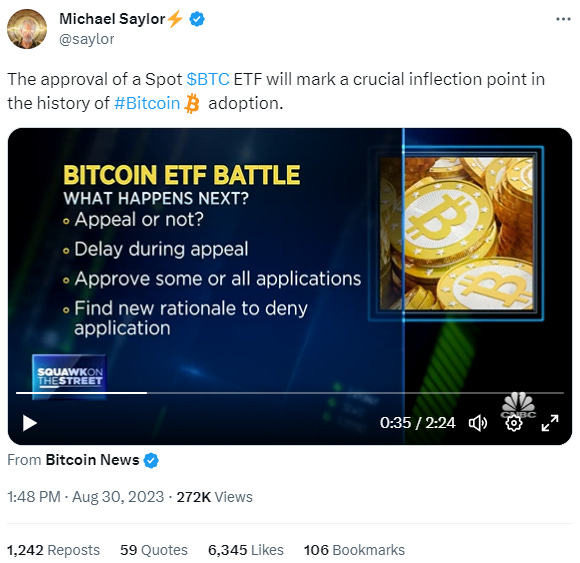Letter #230: All Hail The Bitcoin Spot ETF?
Read now to learn how Bitcoin ETFs are not all they seem.
Dear Readers,
The Bitcoin community is currently awash in excitement and hype over Bitcoin Spot ETFs. Understandably so, since a U.S. Court of Appeals recently rebuked the Securities and Exchange Commission (SEC) for its denial of a major cryptocurrency company’s application to convert a Bitcoin Trust product into a Bitcoin Spot ETF. Some of the biggest influencers in the space are trumpeting their positive opinions of the development to all of their followers:
It would be disingenuous of me to not admit that I myself have generally positive feelings towards the possibility of a Bitcoin Spot ETF being approved. After all, I’m a passionate educator on why Bitcoin matters, and the approval of a Bitcoin Spot ETF in the U.S. may introduce millions of people to Bitcoin. That said, I can’t help but differ, at least slightly, in my opinion of how consequential that ETF may be to Bitcoin’s long-term future for one simple reason: a Bitcoin Spot ETF is not Bitcoin.
What’s In A Bitcoin?
ETFs are often touted as a way for investors to get exposure to Bitcoin without having to hold actual Bitcoin themselves. That is important, we’re told, because of entities like pension funds that have directives that supposedly bar them from holding real Bitcoin.
But is exposure via proxy or derivative “Bitcoin” the way to truly benefit from Bitcoin’s positive qualities, such as resistance to censorship, confiscation, and inflation?
Ask yourself: Does being adjacent to a pile of food satisfy one’s hunger? Does looking at a picture of water quench one’s thirst?
Those examples may seem reductive, but they make the point that we have to do more than just expose ourselves to the idea of something in order to benefit from it. Instead, we have to actively partake of the real thing.
So it is with Bitcoin.
Let’s get one thing straight: If one’s goal is simply to accrue more fiat-denominated wealth, then a Bitcoin Spot ETF *may* help that person do that, at least if Bitcoin’s performance in fiat terms continues its upward movement into the future.
However, a Bitcoin Spot ETF can do nothing to replicate custodied Bitcoin’s ability to grant near total censorship- and confiscation-resistance to its users. After all, the ETF Sponsor, or rather, their custodian, holds the literal keys to the Bitcoin in the fund, meaning there’s no guarantee that you’ll ever be able to redeem your shares for actual Bitcoin. In fact, if you don’t conform to the wants and whims of the ETF Sponsor, its stakeholders, the government, or really anyone else of consequence, you might find yourself locked out of the ETF itself.
There goes your so-called “exposure”.
The Truth About Bitcoin
I’ve said this before and I have no doubt that I’ll say it many more times: Bitcoin is so much more than just a way to (potentially) make money. Bitcoin is a tool — the best tool in the world, in fact — for financial self-sovereignty. By using Bitcoin, you have the chance to protect yourself from the financial misdeeds and abuses of the world, far more than any fiat currency or other financial instrument ever could. Using “paper” Bitcoin, as proxies are often called, greatly limits the extent of Bitcoin’s positive impact though.
Whether you “expose” yourself to Bitcoin by holding real Bitcoin or paper Bitcoin, or choose not to expose yourself to it at all, is completely up to you. If nothing else though, perhaps today’s article has given you some level of understanding around the very real differences between Bitcoin and Bitcoin-based ETFs.
🙋🏽♂️Did You Enjoy This Edition Of The HiFi Bitcoin Letters?
This 3-question survey is your chance to tell me how I can improve the newsletter for you.
This is not financial or business advice. This newsletter and related content are for informational purposes only. Cryptocurrencies and digital assets can be risky. Always do your own research before making any sort of investment.





